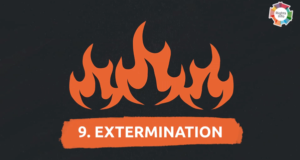5 December 2010 | International Solidarity Movement, Gaza
On Tuesday, the 30th of November 2010, four different individuals were wounded by Israeli gunshots while trying to make their living in the only way they could given the desperation in Gaza’s current economy.
Ismael Sa’aed Qapeen, 31 years old, was doing his daily work collecting stones when he was shot in the foot, causing him to lose three toes. He was in the “buffer zone,” the area spreading up to 500 meters into Gaza where people are at higher risk of being shot at by the Israeli military. He collects stones there, which later are crushed to cement. This is the only way he has to live, with jobs so scarce in the disastrous economic situation of Gaza.“I was about 200m from the fence when I was shot at, without any being given any warning shot. In the beginning I didn’t feel anything, but after a few seconds I started to feel something in my foot. Then I knew that I had been shot. I fell unconscious,” he tells. His friends carried him on a horse cart to Bait Lahya, where an ambulance picked him up and brought him to Kamal Odwan hospital. This was not his first time getting shot, but the third time. The first time was during an Israeli incursion in 2004, when he was shot near his right knee. The second time was two years ago in his hand. This time has been the hardest as the doctors have had to remove three of his toes.
He isn’t the only one in his family who has been shot while working for his livelihood. Two of his brothers have been injured before, too. The first one, Soltan, was 25 when he was shot at his head: by luck, it wasn’t serious. His other brother Mahmoud was shot during an Israeli incursion in 2004 when he was 18 years old, and injured in both of his legs.
Ismael also wasn’t the only person shot on Tuesday. Bayan Farouk Ahmad Tambor, 26 years old, works in trading potatoes. He was was on his way to the field from where he buys potatoes, unaware of an Israeli incursion in the area. At 8am, when Bayan was 600 meters from the fence, without giving any warning shot Israeli soldiers fired two bullets at him: one missed his leg, but the other smashed his shinbone. People from the area rescued him and took him to the hospital, where he received surgery.Other members of his family have also been shot by Israeli soldiers. Two of his brothers have been injured by bullets. Adham was 21, working as a farmer harvesting potatoes, when he was shot in the knee 700 meters from the fence. His other brother, Kaled, was shot in his chest two years ago, in the same area. The wound was so serious it is miraculous he was able to survive.
The third person shot on Tuesday was Ameen Akram Abo Saweash, 22 years old. He and two of his brothers are the only men who have work to support their 14 member family. Ameen and his brothers, Emad, 14 years old, and Moamen, 13 years old work together as scrap collectors. They were 500 m away from the fence when they were shot at on Tuesday. During our interview with them, Ameen himself was not yet able to speak because of the operation he had to undergo. A friend said, “I was with him, we always work together in that area. I was only a few meters away from him when he was shot at without any warning shot. They shot him in his thigh with a dum-dum bullet. The doctors said that it’s going to take him four to six months to recover from this injury until he will be able to start walking again.”
“Isn’t that a crime?” his father interrupts. “With a dum-dum bullet!” It is a crime according to the Hague Convention of 1999, Declaration III, which prohibits the use of expanding bullets, called “dum-dum” bullets, in international warfare.The fourth person injured on Tuesday was Gasan Abo Ryala, 21 years old. He was transmitted to Kamal Odwan hospital where he was treated for a gunshot wound in the leg, but fortunately he was able to leave the hospital soon after.
Tuesday wasn’t an exceptional day. This is an ordinary excerpt from the life of Gaza’s workers in the buffer zone: routine violations of human rights, and brutal crimes committed against Gazan civilians. Ismael, Bayan, Ameen and Gassan will be commemorated only as statistics in the bloody record of the Israeli occupation. But one of them will go on living without three toes, one with a smashed shinbone, and one will go without work for half a year until he can walk again.
“What we will do tomorrow?” one of the friends and fellow scrap collectors at Ameen’s bed laughs bitterly. “We will go back to work, of course. There is no work in this country, as you can see. There is no other option. It’s the only job that is available. If the situation changed, and I found another job, I would do that, of course. I know well how risky this job is, but right now, there is just no other option. So I will go back to work as usual tomorrow”.
 International Solidarity Movement Nonviolence. Justice. Freedom.
International Solidarity Movement Nonviolence. Justice. Freedom.





